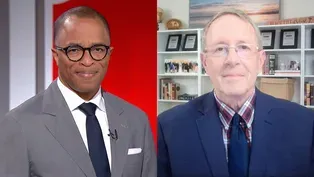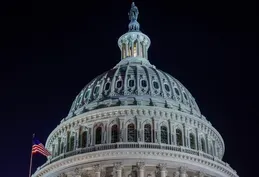
Economy adds jobs despite inflation, interest rate hikes
Clip: 6/2/2023 | 6mVideo has Closed Captions
U.S. economy adds more jobs in face of inflation and interest rate hikes
The latest jobs report shows the labor market remains strong despite rising interest rates. That's good news for workers but it complicates the Federal Reserve's efforts to curb inflation. Economics Correspondent Paul Solman looks at the connections between the labor market, wages and inflation and how they will inform the Fed's next moves.
Problems with Closed Captions? Closed Captioning Feedback
Problems with Closed Captions? Closed Captioning Feedback
Major corporate funding for the PBS News Hour is provided by BDO, BNSF, Consumer Cellular, American Cruise Lines, and Raymond James. Funding for the PBS NewsHour Weekend is provided by...

Economy adds jobs despite inflation, interest rate hikes
Clip: 6/2/2023 | 6mVideo has Closed Captions
The latest jobs report shows the labor market remains strong despite rising interest rates. That's good news for workers but it complicates the Federal Reserve's efforts to curb inflation. Economics Correspondent Paul Solman looks at the connections between the labor market, wages and inflation and how they will inform the Fed's next moves.
Problems with Closed Captions? Closed Captioning Feedback
How to Watch PBS News Hour
PBS News Hour is available to stream on pbs.org and the free PBS App, available on iPhone, Apple TV, Android TV, Android smartphones, Amazon Fire TV, Amazon Fire Tablet, Roku, Samsung Smart TV, and Vizio.
Providing Support for PBS.org
Learn Moreabout PBS online sponsorshipGEOFF BENNETT: Today's jobs report shows the labor market remains strong, despite rising interest rates.
That's good news for American workers, but it complicates the Federal Reserve's efforts to curb inflation.
Economics correspondent Paul Solman looks at the connections among the labor market, wages and inflation and how they will inform the Fed's next move.
JUSTIN WOLFERS, University of Michigan: Holy moly, what a job market.
PAUL SOLMAN: University of Michigan economist Justin Wolfers really liked the latest jobs numbers.
JUSTIN WOLFERS: unemployment is near a 50-year low.
We keep creating jobs.
The economists keep underestimating this economy and it keeps outperforming their expectations month after month after month.
And it's now done so 14 months in a row.
PAUL SOLMAN: But the unemployment rate went up, based on the household survey.
So how does that square with all the jobs added, according to the larger payroll survey.
JUSTIN WOLFERS: We talk with all the big companies.
We talk with a large number of small companies.
And, as a result, you get a very accurate reading on the economy, which is why that's the number that economists emphasize.
We have a much smaller server when they go door to door and ask people if they're working.
That's where the unemployment rate comes from.
Because that's a smaller survey, it bounces up and down a lot.
So I think the more important thing with the less reliable survey is look at the average over a run of months.
And what we have seen as the unemployment rate is hovering round about its 50-year low.
PAUL SOLMAN: Also good news to Wolfers, average pay last month rose by 11 cents point, 0.3 percent, lower than inflation.
JUSTIN WOLFERS: Wages have grown at a rate of around 4 percent over the past six months.
PAUL SOLMAN: Which raises a crucial question: How big a role have higher wages played in driving the inflation surge?
OLIVIER BLANCHARD, Peterson Institute for International Economics: For the most part, inflation hasn't come from wage inflation at all.
PAUL SOLMAN: Olivier Blanchard, former chief economist at the IMF.
OLIVIER BLANCHARD: It has come from energy prices, food prices, shortages.
This has completely dominated the scene.
PAUL SOLMAN: Even to the point of scenes on TV.
ACTRESS: Would you like some lemonade?
ACTOR: I would love some lemonade.
ACTRESS: Five dollars, please.
ACTOR: Five -- what?
ACTRESS: Supply chain issues.
There's a lemon shortage.
Have you seen the price of cups these days?
PAUL SOLMAN: So lots of reasons for inflation, and not just the supply chain snags we have kept showing you, the war in Ukraine.
CLAUDIA SAHM, Sahm Consulting: Truth be told, there was a lot of stimulus, a lot of support that went to households and small businesses early in the pandemic.
PAUL SOLMAN: As well as, adds economists Claudia Sahm, corporations opportunistically raising prices of their goods beyond their costs.
Instead of the so-called wage price spiral, that is, wages driving inflation up and up: CLAUDIA SAHM: I have become enamored with what's called a price-price spiral.
PAUL SOLMAN: At first, firms hiking prices because of their higher costs, but, when those costs go down... CLAUDIA SAHM: Businesses start raising prices, because they see that, oh, the last time I raised prices, it worked pretty well.
PAUL SOLMAN: So lots of factors driving inflation far more than the much feared wage-price spiral, which works how again?
CLAUDIA SAHM: The way a spiral would work is, you have a certain level of inflation in a particular year, the workers see that, they go back in and demand to have wages raised.
PAUL SOLMAN: But with unions on the wane, Sahm doesn't see workers making such demands via mass strikes or walkouts, nor does she expect to.
Bottom line, she says: CLAUDIA SAHM: I think we can get out of this, potentially, with people still keeping wages that are above average.
PAUL SOLMAN: But, here, Olivier Blanchard disagrees.
OLIVIER BLANCHARD: If the Fed really wants to go back to 2 percent price inflation, which is the target, they have to do whatever they need to do to get the wage inflation to be a bit lower.
And the only way we can do this is by having a slightly less overheated labor market or an unemployment rate which is a bit higher than the one we have today.
PAUL SOLMAN: And this is the conventional wisdom, including the Fed's.
But given that rising wages haven't been much of a factor, why are so many economists worried about wage growth at some point driving inflation?
CLAUDIA SAHM: There is a wide range of models that are used by macroeconomists when giving policy advice.
And some of the models, when you hear the wage-price spiral, that was something that did happen in the 1970s.
But, in real time, these have not been good guideposts.
And yet that's what they are.
OLIVIER BLANCHARD: I would fairly strongly disagree.
I think there are parts of economics where we get it wrong and we have to think anew.
But that's not one.
PAUL SOLMAN: And, therefore, a Fed-engineered slowdown, if not recession, to prevent a wage-price spiral.
So, no so-called soft landing where no one gets hurt?
OLIVIER BLANCHARD: We have to increase unemployment above what it is now.
Now, whether you call it soft or not, it's semantics, right?
High unemployment is painful for some.
And so there is no such thing as, you know, a perfectly -- I don't know what the word is, but... PAUL SOLMAN: He later remembered and e-mailed us: "immaculate disinflation."
And if you think there is no such thing, you do what Fed Chairman Jerome Powell is doing, says Justin Wolfers.
JUSTIN WOLFERS: So Jay Powell's strategy, do what we can to wring inflation out of the system, slows the economy, raises unemployment, and cost people jobs.
It's a very, very blunt instrument.
But it's also the only instrument we have.
PAUL SOLMAN: An instrument the Fed might or might not stop using when it next meets in a few weeks.
For the "PBS NewsHour," Paul Solman.
Attacks in Russia raise questions about next phase of war
Video has Closed Captions
Clip: 6/2/2023 | 7m 42s | Attacks inside Russia raise questions about next phase of Ukraine war (7m 42s)
Breaking down the NBA Finals between Denver and Miami
Video has Closed Captions
Clip: 6/2/2023 | 6m 6s | Breaking down the NBA Finals matchup between Denver and Miami (6m 6s)
Capehart and Abernathy on the debt deal and 2024 campaign
Video has Closed Captions
Clip: 6/2/2023 | 11m 44s | Capehart and Abernathy on the debt deal and race for the GOP presidential nomination (11m 44s)
Greenland unveils draft constitution in independence effort
Video has Closed Captions
Clip: 6/2/2023 | 8m 24s | Greenland unveils draft constitution in push for complete independence from Danish control (8m 24s)
White House adviser discusses deal to raise debt ceiling
Video has Closed Captions
Clip: 6/2/2023 | 5m 54s | White House adviser Gene Sperling discusses bipartisan deal to raise debt ceiling (5m 54s)
Providing Support for PBS.org
Learn Moreabout PBS online sponsorshipSupport for PBS provided by:
Major corporate funding for the PBS News Hour is provided by BDO, BNSF, Consumer Cellular, American Cruise Lines, and Raymond James. Funding for the PBS NewsHour Weekend is provided by...















